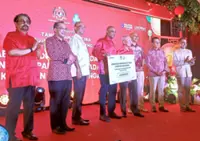SOARING into the sky as a testament to Malaysia’s rich heritage and diversity, the global icon Merdeka 118 Tower at 678.9m is the tallest in South-East Asia and second tallest in the world.
And the person who had made this possible is none other than Tengku Datuk Ab. Aziz Tengku Mahmud, the chief executive officer (CEO) of PNB Merdeka Ventures Sdn Bhd (PNBMV), owner and builder of the superstructure.
His hands-on approach and attention to details at every phase have been instrumental in seeing the development to fruition, after almost 15 years in the making, culminating in the official inauguration on Jan 10, 2024.
He had spearheaded the project planning, concept and schematic design, procurement, construction and the overall implementation of the project components within Merdeka 118 precinct.
The road to success was paved with many challenges, notwithstanding those brought on by the COVID-19 pandemic, which Tengku Ab. Aziz and his team overcame with resilience and determination.
Thus, no one is more deserving to be bestowed with the prestigious Malaysia Property Award™ (MPA) 2023’s Property CEO of the Year by FIABCI Malaysia than Tengku Ab. Aziz.
“I am incredibly grateful and truly honoured for this recognition. This award symbolises not only a personal achievement but also acknowledges the hard work and dedication of our entire team at PNBMV.
“The accolade further reaffirms our commitment to excellence in leadership and innovation within the property sector, and serves as motivation to continue driving positive change in the industry.”
Complementing the city skyline
PNBMV, a wholly-owned subsidiary of Permodalan National Berhad (PNB), was established as a Special Purpose Vehicle for the Merdeka 118 development.
The company acquired the 40-acre Stadia land comprising Stadium Merdeka and Stadium Negara and the adjoining areas from Danaharta Sdn Bhd in 2000.

The integrated mixed development comprises the 118-storey Merdeka 118 tower, a retail mall (118 Mall), 252-room luxury hotel (Park Hyatt Kuala Lumpur), observation deck (The View at 118), one tower of serviced residences (Oakwood Premier Kuala Lumpur) and two premium residential towers with associated facilities.
These include a 4-acre beautifully landscaped linear park (Merdeka Boulevard at 118), a two-storey ‘Look at 118’ building and West Podium with a 1000-pax auditorium and 1500-pax ballroom.
Look at 118 is an experience centre with a textile museum (Merdeka Textile Museum), gift shop, cafe and a dedicated lookout point on the roof top for Instagram-worthy shots of the Merdeka 118 tower.
Tengku Ab. Aziz said developing a mega project in the midst of the historical part of Kuala Lumpur brought its own set of challenges, especially building next to two heritage stadiums definitely required a more careful approach.
The tower overlooks Stadium Merdeka, adjacent to Stadium Negara, of which both were gazetted as national heritage sites in 2005 under the National Heritage Act 2005.
PNBMV, the sole custodians of both the stadiums, has since then carried out a thorough conservation plan, earning Stadium Merdeka the UNESCO Excellence Award for Cultural Heritage Conservation Programme (Asia Pacific) in 2008.
Tengku Ab. Aziz said the architectural design of Merdeka 118 Tower drew inspiration from significant elements of Malaysia’s history and culture.
“The tower’s spire resembles the outstretched hand of Malaysia’s first Prime Minister Tunku Abdul Rahman during the declaration of Independence in 1957.
“Additionally, the facade of the tower is multi-faceted like the different facets of a diamond to represent the diversity of the people of Malaysia in unity.”
As part of the strategy for Merdeka 118 to be a world-class benchmarked development, the tower is targeting triple Green Platinum ratings (LEED, GreenRE and GBI) as well as WELL Certification.
Green design innovations incorporated consist of under floor air conditioning system for all the 84 office floors and 100% rainwater harvesting from roof areas to the rainwater collection tank in the basement.
Whilst noting the physical completion of the Merdeka 118 tower is a milestone in itself, the surrounding communities have also benefitted through various community-related programmes.
“The project is not an ‘island’ but an iconic landmark providing economic and social benefits to the surrounding communities, the city and the nation,” noted Tengku Ab. Aziz.
The Council on Tall Buildings and Urban Habitat has recognised the Merdeka 118 Tower as the first Mega-Tall Building in Malaysia and the Second Tallest Building in the World on Oct 20, 2023.
Superstructure in the making Tengku Ab. Aziz’s vast experience and expertise in property development had provided him with a strong foundation to take on this mammoth project.
He believes that communication is key among his diverse team of professionals, both local and international, of which he has the utmost faith in.
“The whole journey was a never-ending quest of learning and sharing in overcoming the many challenges and demands towards the completion of the development,” he said.
He said to fulfil the objective of building a megastructure required a diverse design principle and analysis evolving through frontiers of engineering.
“Several technical challenges were imminent which prompted the need for strategic planning, execution, monitoring and refinement. One key challenge is the foundation and structural system of the 678.9m-tall tower.
“The immense weight of the tower is supported by a foundation system consisting of bore piles which are 60m in depth and surrounded by sensitive heritage buildings, rail tunnels and educational complexes.
“To minimise the risks of ground movement, a 78m diameter cofferdam was introduced for localised deep excavation and installation of 2.2m bore piles into the ground.”
He added that the well-thought out construction methodology had also assisted the superstructure’s core to advance earlier than the rest of the adjoining structures.
The next challenge is the superstructure which needed to achieve a balance between harmony and safety, architecture, sustainability, human comfort, accessibility, maintainability and various mechanical and electrical system integrations.
“We have a team of experts assembled at the start of the design process to incorporate the best practices and make use of sustainable technologies to cater to the different needs of the tower.
“The mixed usage of the tower as well as duration of construction had also posed challenges to ensure the end product is up-to-date, meets market trend and adopts to changing consumer behaviour,” he concluded.






